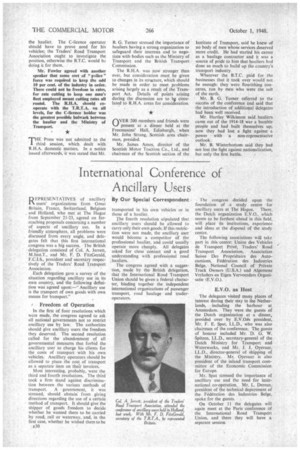International Conference of Ancillary Users
Page 156

If you've noticed an error in this article please click here to report it so we can fix it.
By Our Special Correspondent
REPRESENTATIVES of ancillary users' organizations from Great Britain, France, Switzerland, Belgium and Holland, who met at The Hague from September 21-23, agreed on farreaching proposals concerning a number of aspects of ancillary use. In a friendly atmosphere, all problems were discussed from every angle, and delegates felt that this first international congress was a big success. The British delegation consisted of Col. A. Jerrett, M.Inst.T., and Mr. F. a FitzGerald, F.C.I.S., president and secretary respectively of the Traders' Road Transport Association.
Each delegation gave a survey of the situation regarding ancillary use in its own country, and the following definition was agreed upon:—" Ancillary use is the transport of own goods with own means for transport."
Freedom of Operation
In the first of four resolutions which were made, the congress agreed to ask all national governments not to restrict ancillary use by law. The authorities should give ancillary users the freedom they deserved. The second resolution called for the abandonment of all governmental measures that forbid the ancillary user to charge his clients for the costs of transport with his own vehicles. Ancillary operators should be allowed to place the cost of transport as a separate item on their invoices.
Most interesting, probably, were the third and fourth resolutions. The third took a firm stand against discrimination between the various methods of transport. A government, it was stressed, should abstain from giving directions regarding the use of a certain method of transport. It should give the shipper of goods freedom to decide whether he wanted them to be carried by road, rail or waterway, and, in the first case, whether he wished them to be E30 transported in his own vehicles or in those of a haulier.
The fourth resolution stipulated that ancillary users should be allowed to carry only their own goods. If this restriction were, not made, the ancillary user would become a competitor of the professional haulier, and could usually operate more cheaply. All delegates asked for close contact and a good understanding with professional road . ha uliers.
The congress agreed with a suggestion, made by the British delegation. that the International Road Transport Union should be given a federal character, binding together the, independent international organizations of passenger transport, road haulage and traderoperators. The congress decided upon the foundation of a study centre for ancillary users at The Hague. There, the Dutch organization E.V.O., which seems to be farthest ahead in this field, will place its institutions, experience and ideas at the disposal of the study centre.
The following associations will take part in this centre: Union des Vehicles de Transport Prive, Traders' Road Transport Association, Association Suisse Des Proprietairs des Autocamions, Federation des Industries Beige, National Council of Private Truck Owners (U.S.A.) and Algemene Verladers en Eigen Vervoerders Organisatie (E.V.0.).
E.V.O. as Host.
The delegates visited many places of interest during their stay in the Netherlands, including the harbour at Amsterdam. They were the guests of the Dutch organization at a dinner, presided over by E..V.Ois president, Mr. F. E. Spat, LL.D., who was also chairman of the conference. The guests of honour included Mr. D. G. W. Spitzen, LL.D., secretary-general of the Dutch Ministry for Transport and Waterworks, and Mr. J. J. Oyevaar, LL.D., director-general of shipping of the Ministry. Mr. Oyevaar is also president of the inland transport committee of the Economic Commission' for Europe.
Mr. Spat stressed the importance of ancillary use and the need for international co-operation. Mr. L. Dereux, president of the technical department of the Federation des Industries Beige, spoke for the guests.
On October 11 the delegates will again meet at the Paris conference of the International Road Transport Union, and there they will have a separate session.












































































































































































































































